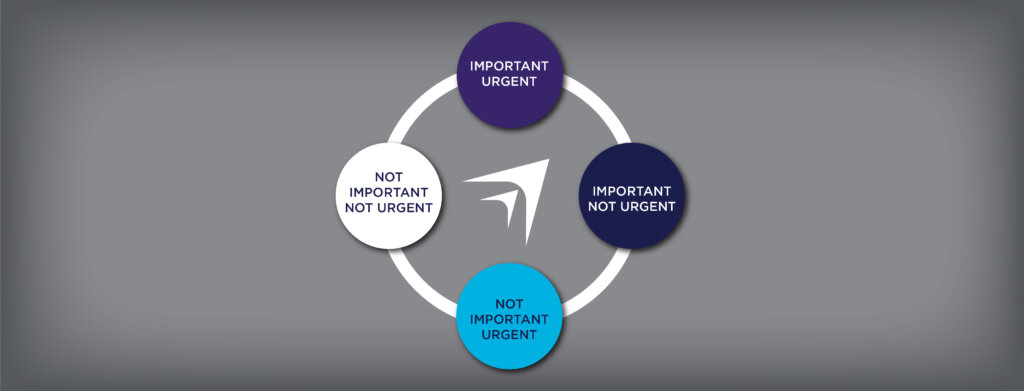Executive Podcast #254: Is the Urgent / NOT Important Quadrant Killing Productivity?

You have most likely heard of the Urgent and Important Matrix. It is officially known as the Eisenhower Matrix. The key to your productivity is not getting the most stuff done, but getting the right stuff done. And by “right stuff,” we mean your most important priorities.
But what are we to do with all those urgent tasks that have a funny way of sounding important. To be a high productivity leader you need a system to capture your inputs and determine your priorities.
Download our Learning Guide for this podcast!
Perry Holley:
Welcome to the Maxwell Leadership Executive Podcast, where our goal is to help you increase your reputation as a leader, increase your ability to influence others, and increase your ability to fully engage your team to deliver remarkable results. Hi, I’m Perry Holly, a Maxwell leadership, facilitator and coach.
Chris Goede:
And I’m Chris Goede, executive vice president with Maxwell Leadership. Welcome and thank you for joining. Really appreciate those that are listening or watching. We’ve said this in the past. We want you to share this not only with peers and members of your team, but then man, take it and have conversations about it. I know that we continue to talk about how that’s impacting teams around the world and organizations, and so we’re grateful for that. Hey, as we get started, Maxwellleadership.com/podcast is where you can go and fill out a form if you have a question, a topic for Perry to address in our upcoming podcast, or maybe you guys need some help around developing your leaders and your culture. Fill out that form. We would love to get in touch with you and follow up after that. Today’s topic. This is something that most people are probably pretty familiar with, but I know this is something you’re really passionate about. I’ve heard you talk about it a lot and it is something that we have made part of our team as we begin thinking about what does this look like and what we’re doing. And we’re going to unpack this quadrant. So a little teaser there. You’re probably very aware now when I say that what that looks like. We’re really only going to talk about one of them in specific today. And so today’s topic is, is the urgent not important quadrant killing your productivity? This is also known as the Eisenhower Matrix, and the key to your productivity is not getting the most stuff done, which, by the way, I love to mark off my little yellow pad of paper. And at the end of the day, look at all the things that I’ve marked off, whether they’re right or wrong. But it’s really about getting the right stuff done. And the right stuff is what is the highest priority for you as a leader inside that organization. So we are going to talk about one quadrant. We’re going to talk about the urgent but not important. And I love that you are bringing this back up for us. This is really coming out of we were just talking a client of ours, and a lot of us fall prey to this and have this feeling that everything is urgent and important and we think we got to do it now and it disrupts our workforce. Talk a little bit about why you’re bringing this to us and some of the conversations with one of those clients that led up to this.
Perry Holley:
We’ve been asked to speak a lot lately on productivity, time management, how to priority setting, all these types of things that are so important to leadership. And I was going to speak to the group, and I asked the leader could they write for me in their team’s world, what are the urgent and important tasks that would happen? So if you’re not familiar with the quadrant, you can go to the learner guide today and see a picture of it. But it’s urgent and not urgent, important and not important in the four quadrants. And I said, can you tell me what are the urgent and important things? What are the important but not urgent things? What are the important but not urgent things? And he said, if it’s important, urgent not important. He said, if it’s urgent, it’s important. I said, oh, dude, no. That’s where you’re coming off the rails here, is that urgent things have a funny way of sounding important, just out of the nature of what urgent things? And so you think, what could these things be? And it could be an urgent, important things. Is a customer calling with a problem? A customer calling? You have to determine is that also urgent or is it important but not urgent? Then I can schedule that. But what’s interrupting me every day and are these urgent and important things? You definitely have to deal with them, but they’re not urgent but important. I’m still letting them interrupt me, and then I’m not even this now we’re below the line. It’s not important. By definition, you’ve decided it’s not important, but now it’s urgent. I’m still going to do it. No, we had a big discussion about it, and it kind of unfolded this whole discussion about how do I use this matrix to be more productive?
Chris Goede:
And what’s interesting is that’s just one of the distractions that happen to all of us in a day. And that’s really what they were talking to you about, is, man, we got these distractions and how we do that. And then you got them down into this quadrant, and then you’re like, oh, well, this is a big problem because you guys think everything they couldn’t put.
Perry Holley:
Anything in the quadrant, but we had a big discussion. They can put anything in the quadrant. And it all moved up to even though it’s not important, it’s urgent.
Chris Goede:
It’s now important for them. Any of us that have led a team, you know, from a high producing team, you’ve got to have your priorities straight. And so one of the big learnings for me in this is that this is my quadrant. This is not the organization’s quadrant. Now, there is some overflow to that, right? There are some things that, as a leader, that will fall up, that will roll up to the organization, fall down to my team that I need to be aware of. But this is really specific to me, and it’s customized to me. So what is urgent to me, what is important to my time, to me, and so I can’t allow to your point? I can’t allow someone else’s urgency to become urgent to me. I have to really have intentional consideration to that request. It may be right, it could be, but most of the time it’s probably not in regards to my priorities for the organization or my team versus someone else’s.
Perry Holley:
This is the number one learning here. And I’ve seen executives, I mean top executives sit in a workshop with their team and I give them some challenges. Here’s an email that just came into you. Here’s a voicemail that someone left for you. Somebody stopped by your office and threw this on your desk. And I give them these little scenario cards and says, so place them on this Eisenhower matrix, on this urgent and important matrix. And I’m noticing the upper left urgent and important is starting to get a little heavy. And one of the emails, I laugh because one of the cards says, email subject need to see you urgent. Four exclamation points. And they go, oh, man, urgent, important. I said, no, you just said, this is your matrix. You have to determine what column does it go in? Urgent or important? Urgent or not urgent and is it urgent to me? And now there are certain things, and we’ll probably talk about it, but what makes something urgent to you? So John Maxwell calls and says, chris, I need something immediately. You say, is it urgent, not urgent, right?
Chris Goede:
Yeah, who said it? Sometimes, yeah, who said it? And then what is being asked? And this really helps. When I began to think about this, it really helped with my decision making filter is kind of what I call it, right? Because I have a tendency to want to respond, want to help, want to serve, whatever. And so all of a sudden I’m like, man, if it’s urgent to them and it’s got four exclamation points in the subject line, then I am absolutely going to do it. But I found that that is not the best for me personally or for the organization as a leader. And so, yeah, it definitely hinges on what is being asked, who is being asked, and then how does that align with my priorities.
Perry Holley:
Well, and this is such a huge lesson for leaders also. Just the backside of this one is who said it matters. So if John calls and says, I need something, or Mark Cole calls and says, I need something, you probably will interrupt what you’re doing to handle that. You should be aware that your words carry weight. And I’ll never forget, I was traveling with a senior exec. I was driving to the location, the senior exec was in the passenger seat, and he was looking at his phone. He said, I’m sorry, Perry. I said, sure, whatever you got to do. So he takes the phone and he calls and he goes, hey, I just saw your note. If you send that to me before Tuesday at nine, I’ll delete it. Okay, good. Yeah. And he hangs up. Now you’re like, I’m trying not to look around. What was that about?
Chris Goede:
I got a couple of questions.
Perry Holley:
But fortunately, he read the situation. He goes, let me tell you what’s going on, because he’s the senior exec. When he says something to somebody, hey, I need to see that report. And this was on a Friday afternoon at about 03:00, and I’m driving to the airport, and he made this email, could I get the copy of that report? The people because it was him, it jumped into urgent and important to the people on his team. And the response he got from somebody was, I’m at a client location right now, but I’ll have that to you before 09:00 a.m. Tomorrow morning, Saturday morning. And this just flew all over this exec. He said, because it’s me, I need to be clear. So he was, I’m changing my whole communication. I need to see this report and could I have it by Tuesday at 09:00 a.m.? I don’t need it over the weekend. But I said, you need to be aware your words carry weight.
Chris Goede:
They do.
Perry Holley:
And so if people are having trouble being productive, are you a source of that problem?
Chris Goede:
Doing that not only real quick, not only do your words carry weight, I’ve also heard you say and people talk about, hey, just understand your title walks in the room before you do it.
Perry Holley:
Before you do.
Chris Goede:
Yeah, before you do.
Perry Holley:
So I had a few things, and then we already killed number one, which was, the matrix is your matrix. It’s not someone else’s matrix. That is why it’s very clear when you’re capturing your inputs, emails, text messages, voicemails, somebody stopping by your office, you capture that you need to make a quick decision. Even though it may sound urgent, it may seem important to them, what is it to you? And this is going to be hard. Like you said, who said it and what’s being said, I may have to make a decision that it really is not urgent, doesn’t mean to handle now, but it does need to be handled by me. Oh, it is not urgent, not important could it be handled, but it is important to them, could it be handled by someone else? So the idea here is using the matrix to make decisions about that. Leaders.
Maxwell Leadership Growth Plan:
You know better than anyone that growth is essential if you want to make tomorrow better than today. But fitting growth into your calendar takes intentionality and self discipline. So let Maxwell Leadership help make your growth achievable. You’re invited to join thousands of worldwide leaders in using the Maxwell Leadership Growth Plan. The Maxwell Leadership Growth Plan provides you with convenient and easy to implement leadership resources, including video lessons from John Maxwell, all at your fingertips, available in our Maxwell Leadership app or online. You’ll be coached by many well known leadership experts that will help you achieve your growth goals. You can even listen to this podcast right there in the app. Check it out for free today at Growth.Maxwellleadership.com. That’s Growth.Maxwelleadership.com.
Perry Holley:
Let me go to number two because we already killed that one. Was I’m always thinking, what column is it in? So is it in the urgent, not urgent column? And so what road does it fall in? So when I’m thinking about important and not important, and I go back to the saying that really resonates in my mind that urgent things have a funny way of sounding important, it really matters how you discern quickly to you, is this an urgent or an important thing to do?
Chris Goede:
Yeah, I love that we’re not only looking at the urgent versus the not urgent, but then also let’s look at a little bit about the important versus the unimportant. To your point, that situation may be important to an individual on your team, but it’s probably not extremely important right now for you. And so you’re going to get to that because it’s important to them. It’s just around the timing of it. What I love is that you have broken this down into, hey, let’s talk about labels for these so that we don’t get kind of confused. And this is what has helped my decision making filter. So it’s still the Eisenhower, right? It’s still, hey, let’s talk about the urgent, not important, all this stuff. But I want to break it down for you into kind of the four categories with simple words that you may be able to just kind of remember to be able to apply this. So in the upper left quadrant, right? So we’re talking about this, it’s urgent and it’s important. That would be a request from John or Mark. And we got to get that to him, right?
Perry Holley:
Or me.
Chris Goede:
Or you. Yeah, you’re in one of these quadrants. I wasn’t going to bring that up, but when it’s in that upper left hand quadrant and there’s no communication from them as an exec to the example you gave in the car about Tuesday at nine, then it’s like, hey, I got to do it now. Right. So upper left hand corner, urgent and important is do it now. When it comes to not urgent but important, let’s get it on the schedule.
Perry Holley:
So that would be the upper, that.
Chris Goede:
Would be right, upper right. So we’re still on the top half?
Perry Holley:
Top half, right?
Chris Goede:
Top half. So it’s either do it now or schedule it. So we’re acknowledging that we need to above the line there, that it’s important. It’s just you’re making a decision between urgent and not urgent. So are we doing it now or are we scheduling it now? Let’s drop below the line in the bottom two where the lower left is urgent, but it’s not important. So this is where you were just talking a little bit ago about delegating it. Right. So that’s the word we’re going to put in that box right there, it’s delegate it. And then finally the lower right is it’s not urgent and it’s not important. And I love this you have in my notes just, well, delete it, don’t do it. That’s hard for some people, but we need to think about that. So let me just real quick, do it now or schedule it. Upper side of this quadrant, bottom half is delegate it, bottom left or delete it and don’t do it. And so I think this is something that if you can just remember those four, it’ll help you as you keep your priority straight and things come into your inbox.
Perry Holley:
So let me ask you something that you’re a good example of this, but I wonder if it’s hard for you because our culture today, in our society, that messaging is instantaneous. Text messages come in and I have to make a decision. This is where I think leaders could do a lot better. I think you do a really good job with this. But I wonder if it’s hard because I’ll send you a text and I’ll say, hey, Chris, I need to talk to you about this. Something’s come up. Do this. You have to make an immediate who’s saying it? Perry. What’s? Perry asking? And you have to decide, is this an urgent issue that Perry’s bringing to me or is this an important issue that Perry’s bringing to me? It is important and so everything does not have to be responded to immediately. I think we get trained.
Chris Goede:
Absolutely.
Perry Holley:
I see a text now. I’m working on something really diligently. I’m focused on a priority. I hear a buzz or hear a chirp or a cheem or a chime or a ring or a bell and I turn now. I’ve been distracted. And then I decide, well, I’ll just answer that now. But I didn’t think through what does that need to be answered now? Is that an urgent or an important thing? And I noticed that I send you a text and someday it’ll be the next day, you’ll get back to me. I don’t take offense at this because I know we’re both trying to learn these lessons and teach them on our teams is to do this and that. You’ve made a decision somewhere in there. Was that what Perry asked, urgent and or important and does it need a response now or can it wait to do that? Is that hard because I want to respond right away or is so much coming at you?
Chris Goede:
Well, I’m notorious and have a little.
Perry Holley:
Bit of I’m not talking email, which goes weeks well.
Chris Goede:
I know. Even text right. My wife’s like, hey, you’re going to respond to that text? And so as I filter through is what I’m doing right. I’m thinking about who do I need to get after today? What I wasn’t going to say, but I might as well bring it up right here. Is Perry. Most of your texts go in that bottom right quadrant. I just deleted. Don’t do it. No, I’m just kidding.
Perry Holley:
I knew that.
Chris Goede:
But it is hard. I can’t remember who it was. And I was doing a study and a development where they were talking about intentional work time. And you shut off, by the way, I don’t know if people know this, right, you can still be online, but you can turn your email off, right? Work offline, so you don’t have to hear that. Yeah. And you don’t look up and go, I need to respond to that same thing with the text is how do you then uninterrupted when you’re really working on something as a priority? This is not in any quadrant. This is just me reacting to your comment, because there’s the tendency for all of us with technology today to always be responding, always be engaged. And I think that’s a huge problem when it comes to productivity. Now, back to your point, is that I do make an initial response when I see things, and then if things can wait, then I will not respond right away and then hopefully remember to get back to them. I think a better practice for me would be if I have the time in the moment is to respond to a text. You say, Got it. What’s the expectation on us getting this on the calendar? So then I allow you to give me a little bit more information so that I still can determine where it falls in my quadrant. I just need a little bit more information. And then I think that would also show a little bit research, you understand? You get it. We have relationship where we talk even outside of just scheduled meetings, but I think being able to do that would help me become a little bit better of a leader in regards to managing requests and where it goes into the Eisenhower matrix.
Perry Holley:
And then using your administrative partner effectively is also you say this is important, but it’s not urgent. Angie, could you help me get this on the so you don’t actually have to own it right away, but we will have to deal with it when it gets on the calendar. Brings up a great point about this whole you use the terminology above the line and below the line. So if you’re thinking about the matrix, above the line is the important things either urgent or not urgent? The things below the line are not important, either urgent or not urgent. And the idea there is and use the words delegate and eliminate in these bottom two quadrants that should you ever be doing anything below the line, if you can get clear in your mind, this is the quadrant. Perry just made a request. Something just came in. Somebody stopped by my office. Whatever. Things are trying to interrupt you all day long. There’s no lack of distraction, but I have to make the call. That is a below the line activity. I’m either got to get somebody else on it or ignore it. And I think this is really hard for leaders. I think we want to be good people. We want to be responsive. We want to be helpful. And now I can’t get my job done. I can’t figure out why I’m having to work nights and weekends because I’m spending all day working below the line. But it feels good, and I feel like I’m making proud. Like you said, I check a lot of things off, but none of them had any value moving toward my priorities.
Chris Goede:
I know this is a four point kind of four box matrix, but you have lived by this. You’ve taught it for such a long time. Let me ask you this question. Do you think, as leaders, that as we think about our priorities, do you think our first filter should be is this important or is this unimportant? Or should our first filter be is this urgent or not urgent? I’m sitting here. This is kind of off the cuff right here, and I’m looking at this box, and I’m going as this comes in, I get a text from Perry versus going urgent versus non urgent. Do I go, is this important or unimportant? And then I determine where it is. So do I determine if it’s on the bottom of the matrix or the top of the matrix first? Or do I determine, is it on the left or the right side of the matrix?
Perry Holley:
I love the question. I think the correct answer is I need to determine up or low if it above or below a line. If it’s important, not important. But I’m telling you, what happens is I text you. I’m speaking to some large group, and I’ve gotten there, and I don’t have my presentation. I mean, whatever. And I think chris, I’m in trouble. The urgency in my text or is going to precede anything about importance. You’re going to think, is it really that urgent? I’ll say, Chris, we got to get a schedule for the team outing next week, and we haven’t reserved the time at Topgolf, and we got to get the all you go, okay, while that sounded very urgent, is it urgent? It depends on reservations at Topgolf. But is it important? Yes, but it could wait.
Chris Goede:
Yeah, I know. It’s almost like it’s a trick question, right? Like when we say this or that or we’re like, okay, we know this is the trick question. I was just looking at that, and I was going, how do I filter through that? Let me wrap us up by saying this, which is, remember, this is your quadrant. Yes. There are people that all of us could think about right now on our team, that everything is urgent comes with bolds, and it comes with, we got to talk right now. And then there’s others that don’t communicate that like but they’re still urgent items. And so you got to understand that about your team. But it is your quadrant. I think if you really get good at this, it’ll allow you to work smarter then harder. It’ll be able to update your quadrant regularly. I know some people that actually print it out and work off of it. So you continue to update that. And then I think, finally, as I mentioned early on, this will help you if you’re bad at making decisions and you’re not decisive, this will help you become better at making decisions of how you use your time and how you.
Perry Holley:
That’S actually how Eisenhower developed it for that decision making thing. You’re also training people about how you handle urgent and important. Just think about it. You kind of trained me that if I don’t get a response instantaneously like I’m used to with so many others, it’s not life or death. You don’t hate me. You’re not ignoring me.
Chris Goede:
It’s not personal.
Perry Holley:
It’s not personal. You actually have a methodology about how you’re handling things. And I’ll hear from you based on the if it’s urgent, I’ll hear from you sooner. If it’s not, I won’t. And you’ve trained me that way. And I think we train people a lot about what they can expect from us. And so you need to be intentional about I definitely want to be responsive, but on the right things, I want to make good, wise decisions on when do I need to respond immediately and when will I not? Some emails don’t get responded to on the day they were received. Some do and must get responded to immediately. So you need to realize you’re training people on what they can expect from you.
Chris Goede:
That’s good.
Perry Holley:
All right, great having you with us. And reminder, if you want to leave us a comment or a question, you want to get the learner guide, you want to learn about our offerings, the other podcasts in our podcast family. You can do all MaxwellLeadership.com/podcast. We love hearing from you. We’re very grateful you spend the time with us. That’s all today from the Maxwell Leadership Executive podcast and.
To be a Successful Leader, You Need Feedback on Your Leadership.
We’re excited to announce our new and improved Organizational Effectiveness Survey (OES). The OES gathers feedback from employees to give leaders and management the knowledge and action plans needed to develop a more effective and productive work environment. Our new version measures 4 areas of your business: Leadership, People, Strategy, and Performance.













Be the first to comment on "Executive Podcast #254: Is the Urgent / NOT Important Quadrant Killing Productivity?"